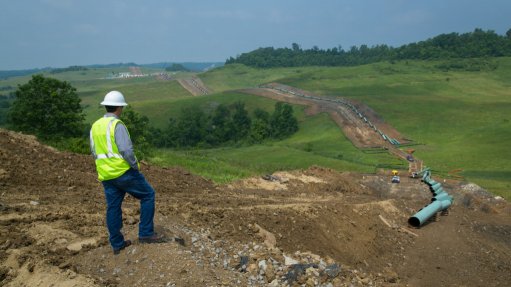Violent protests in Moz gas, mining sectors forecast to surge in coming months
Mining and gas projects in Mozambique are likely to be affected by an increase in violent protests in the coming months, as local residents attempt to extract additional compensation from mining companies, especially in regions where projects are entering the construction phase, says political risk forecaster Exclusive Analysis, which was recently acquired by global advisory firm IHS.
Deputy head of Africa forecasting Robert Besseling tells Mining Weekly that, in recent months, there has been an increase in violent incidents at mining development sites in Tete province, in the north-west of Mozambique. Most of these incidents have to do with forced relocations and the lack of skills development in mining-prevalent regions.
As a result, protestors demanding greater benefits from the mining sector have been targeting mining sites and railway lines across the country.
Late last month, local reports voiced the dis- content among Tete community members, who had been forcibly relocated to make way for coal mining operations and were dissatisfied with the compensation they received.
This echoes the protests of Moatize local residents in January 2012, who blockaded the Sena public railway to prevent the transportation of coal from Tete to the Beira port.
Besseling likens the unrest brewing in Mozambique to discontent in the Tanzanian natural gas sector, which has also been experi- encing violent protests, motivated by discontent at relocations and a lack of local development.
“Given that local communities are becoming increasingly active and belligerent against the development of mining projects in Tete and that they are motivated by the protests experienced in Tanzania’s natural gas sector, Exclusive Analysis concludes that Mozambique’s natural gas sector is likely to face similar protests as it develops,” he says.
Besseling tells Mining Weekly that civil protestors sabotaged the construction of liquefied natural gas (LNG) pipelines in Mtwara, which is destined to be the key port for Tanzania’s natural gas sector, in December and January. Damage estimated at $300 000, compounded by about $1-million in overrun costs on the pipeline, was incurred.
However, apart from the pipeline attacks, Tanzanian protestors have not been targeting gas companies, as they blame their local government for not enforcing localisation within the growing energy sector, Besseling points out.
He maintains that this lack of local beneficiation has been the primary cause of the stunted development of LNG infrastructure in Mtwara and predicts that the same turn of events is likely to occur in Mozambique.
“Although Mozambique, like Tanzania, is redrafting its natural gas legislation, its civil activist groups, political opposition and even some members within the ruling party are already criticising the Mozambique government for the lack of wealth and development in the country, ” Besseling says.
He further maintains that neither the political opposition within Mozambique nor the civil activist groups are having any effect on the natural gas legislation yet.
The legislation is drawn up by State-owned companies involved in the petroleum sector and key industry gatekeepers within the natural gas sector who are also involved in the upper echelons of the political system.
Besseling predicts, therefore, that those civil society groups “clamouring for change and greater skills development” are more likely to launch protests at construction sites, owing to their lack of legislative influence.
He highlights US-based independent oil and gas exploration and production company Anadarko Petroleum’s LNG development pro- ject and that of Italy-based integrated energy company ENI, both based in the Rovuma basin, as potential targets that are likely to face these types of protests as soon as construction begins.
Meanwhile, the Mozambique mining sector, which is dominated by mining majors such as Vale, Rio Tinto and the Eurasian Natural Resources Corporation (ENRC), faces ongoing protests.
“The construction of two major railway lines has been disrupted on several occasions in the last 18 months, owing to forced relocations,” explains Besseling.
With no way of transporting its coal stock, Brazil-based diversified miner Vale was forced to stockpile.
Forced relocation disputes are reportedly resolved for now, which means that production will soon be back on track, but Besseling warns that the unrest will not disappear overnight.
Besides the issue of forced relocations, the lack of local beneficiation, environmental damage and a general public perception that foreign investors are exploiting Mozambique remain problematic.
“Vale, Rio Tinto and ENRC, together with other major coal mining players in the country, are likely to have changes made to their contracts over the next few years in terms of local procurement and skills development,” predicts Besseling, adding that changes in taxation and State-ownership policies may also be in the pipeline.
Comments
Press Office
Announcements
What's On
Subscribe to improve your user experience...
Option 1 (equivalent of R125 a month):
Receive a weekly copy of Creamer Media's Engineering News & Mining Weekly magazine
(print copy for those in South Africa and e-magazine for those outside of South Africa)
Receive daily email newsletters
Access to full search results
Access archive of magazine back copies
Access to Projects in Progress
Access to ONE Research Report of your choice in PDF format
Option 2 (equivalent of R375 a month):
All benefits from Option 1
PLUS
Access to Creamer Media's Research Channel Africa for ALL Research Reports, in PDF format, on various industrial and mining sectors
including Electricity; Water; Energy Transition; Hydrogen; Roads, Rail and Ports; Coal; Gold; Platinum; Battery Metals; etc.
Already a subscriber?
Forgotten your password?
Receive weekly copy of Creamer Media's Engineering News & Mining Weekly magazine (print copy for those in South Africa and e-magazine for those outside of South Africa)
➕
Recieve daily email newsletters
➕
Access to full search results
➕
Access archive of magazine back copies
➕
Access to Projects in Progress
➕
Access to ONE Research Report of your choice in PDF format
RESEARCH CHANNEL AFRICA
R4500 (equivalent of R375 a month)
SUBSCRIBEAll benefits from Option 1
➕
Access to Creamer Media's Research Channel Africa for ALL Research Reports on various industrial and mining sectors, in PDF format, including on:
Electricity
➕
Water
➕
Energy Transition
➕
Hydrogen
➕
Roads, Rail and Ports
➕
Coal
➕
Gold
➕
Platinum
➕
Battery Metals
➕
etc.
Receive all benefits from Option 1 or Option 2 delivered to numerous people at your company
➕
Multiple User names and Passwords for simultaneous log-ins
➕
Intranet integration access to all in your organisation


















